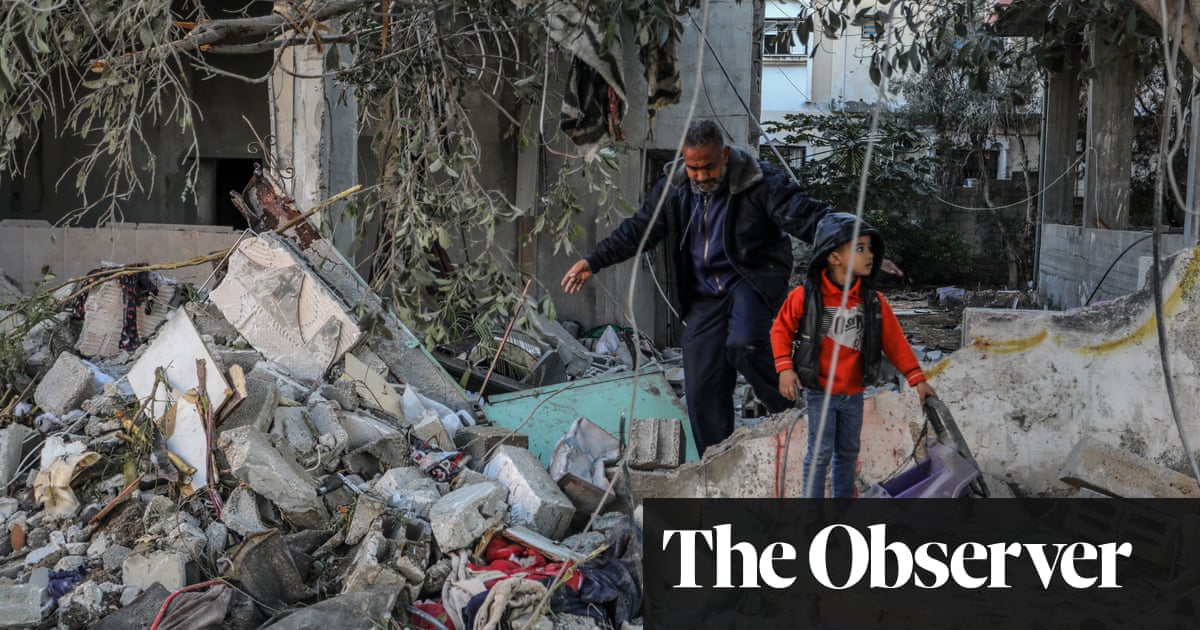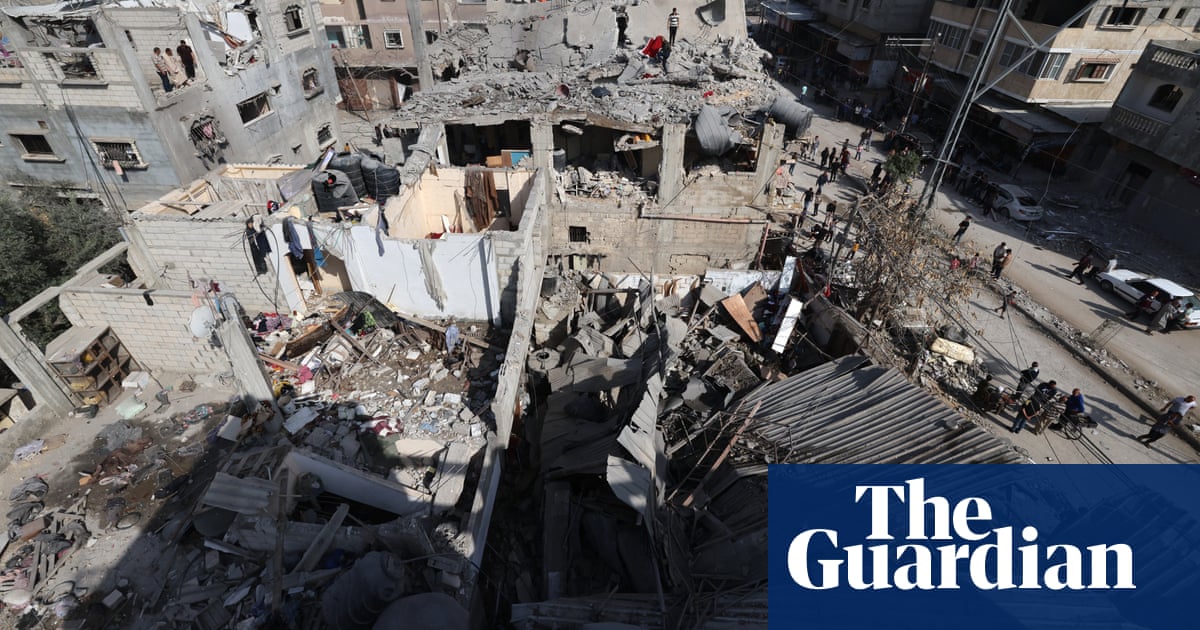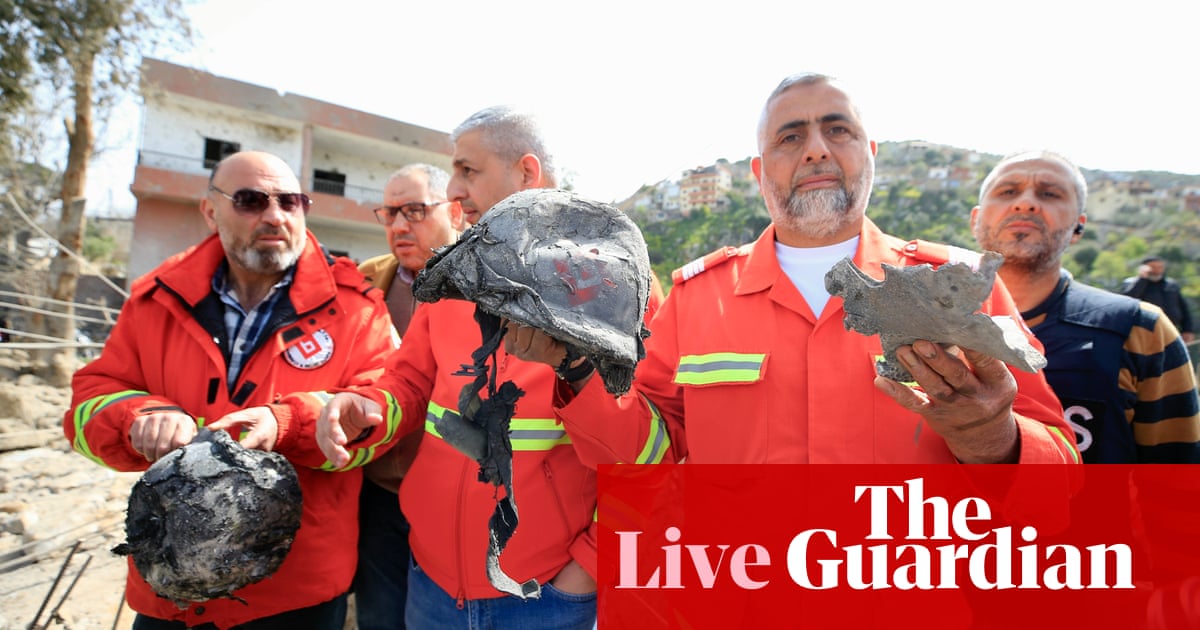
Israeli forces struck densely populated areas across the middle and southern Gaza Strip in a midnight attack on Friday and early Saturday, killing at least 25 people amid fears of an impending push south by ground troops as pressure builds for a ceasefire deal.
Israeli fighter jets struck Deir al-Balah, in the central Gaza Strip, as well as the city of Rafah in the south. The Palestinian health ministry in Gaza said at least 107 people had been killed and 165 injured overnight.
The overwhelming majority of Gaza’s 2.3 million people are displaced, according to the UN’s Office for Humanitarian Affairs (Ocha), with more than half the territory’s population now crowding into makeshift camps and on to the streets of Rafah city.
“Rafah is now a pressure cooker of despair, and we fear for what happens next,” said the Ocha spokesperson, Jens Laerke.
Rights groups estimate that some 1.9 million people are now crammed into Rafah, a city previously inhabited by roughly 250,000 people. Israel’s defence minister, Yoav Gallant, said earlier this week during a visit to ground forces stationed in Khan Younis that they will “complete the mission” there before moving just a few miles south to Rafah.
Gallant added that military pressure will force the return of at least 136 hostages held by Hamas and other groups. “We will continue until the end – there is no other way,” he said.
The UN’s agency for Palestinian refugees estimates that tens of thousands have fled Khan Younis in the past week, terrified of the deepening Israeli advance, now clustered along the border area that separates the southernmost part of Gaza from Egypt’s Sinai peninsula.
“We feel now that somehow it’s our turn: death is getting closer,” said Haneen Harara, an employee at a Dutch humanitarian organisation who fled to Rafah with her family after being displaced several times.
People in Rafah were still trying to get essential items like clean water and canned food she said, “as they force themselves keep going, even with the fear they carry inside them”.
The threat of a heightened assault on the last refuge for the majority of Gaza’s population has raised the stakes of ongoing talks intended to produce at least a temporary ceasefire agreement as well as the return of the Israeli hostages.
Qatari officials, who are mediating the talks along with Egyptian spy chief Abbas Kamel, expressed newfound optimism throughout this week that an agreement was in sight. This followed a meeting last weekend in Paris to discuss a framework deal between Kamel, the CIA director William Burns, the head of Israel’s Mossad David Barnea and the Qatari prime minister Sheikh Mohammed bin Abdulrahman bin Jassim Al Thani.
During a talk at the Atlantic Council in Washington on Monday, Al Thani said talks “are at a much better place than where we were a few weeks ago” and that the framework deal had been presented to Hamas for discussion. He also met some of the families of those held hostage while in Washington.
Gili Roman, whose sister was taken captive when Hamas attacked Israel on 7 October – and who was freed in November – described “cautious optimism” from the Qatari prime minister during the meeting.
Roman, whose sister-in-law is still held hostage in Gaza, said he appreciated the Qatari prime minister’s sense of commitment to getting a deal done, but that for the families, the need for a swift resolution to the hostage crisis is “a humanitarian issue”.
The proposed deal would see a two-month pause in fighting intended to set up talks for a permanent ceasefire, as well as the phased release of 136 hostages held by Hamas and other groups in Gaza. A 30-day period where women, the elderly and the sick would be released would be followed by the release of male hostages and those Hamas considers active military personnel.
Reports from those involved in the talks suggest that major divisions remain, but the draft deal is intended to overcome the primary obstacle of objections to a permanent ceasefire.
A representative from Hamas said they are still studying the current proposal, including a flurry of ongoing meetings to discuss the deal. “It is being studied and we will respond as soon as possible,” they said.
They fiercely denied reports of disagreement within Hamas over the deal, despite impressions of a split between members of the political movement based in Doha and firebrand figures including Yahya Sinwar, who remains underground in the Gaza Strip, along with leaders of the group’s military wing.
Hamas leader Ismail Haniyeh was expected in Cairo for talks late last week, but a representative from the group said that neither a date for a visit nor a delegation had been set yet.
Osama Hamdan, a member of Hamas’ politburo in Beirut, told a Lebanese television channel on Friday night that the group is also seeking freedom for high-profile Palestinian detainees including Marwan Barghouti, the high-profile leader of a paramilitary offshoot of the Fatah political party, imprisoned since 2002, and Ahmad Saadat of the Popular Front for the Liberation of Palestine (PFLP).
The group hopes that “all prisoners will be released”, Hamdan told LBCI, adding that Hamas’ demands are “an end to the blockade of the Gaza Strip, the implementation of a total ceasefire and obligations for the reconstruction” of Gaza.
Israeli bombardments have decimated the enclave, with more than 27,000 people killed and an estimated 65,000 wounded.
“We will not compromise on anything less than total victory,” said Israeli prime minister Benjamin Netanyahu earlier this week, brushing aside any potential talk of a permanent ceasefire.
“I hear talk about all kinds of deals. I would like to make it clear: we will not conclude this war without achieving all of its goals. This means eliminating Hamas, returning all of our hostages and ensuring that Gaza never again constitutes a threat to Israel.”











